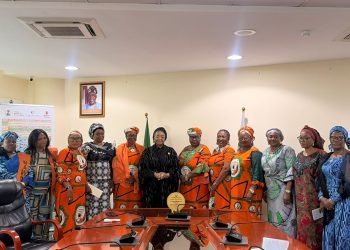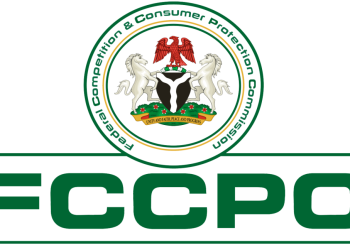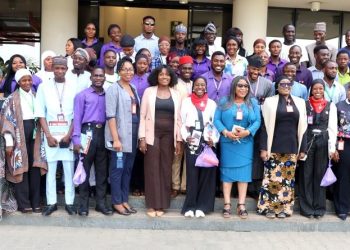By Nkechi Eze
The Executive Chairman of the Economic and Financial Crimes Commission (EFCC), Mr. Ola Olukoyede, has issued a strong call to action to all stakeholders engaged in the fight against money laundering and illicit financing. These include Designated Non-Financial Businesses and Professions (DNFBPs), Licensing Authorities, and Self-Regulatory Bodies (SRBs), who have been urged to strictly comply with ongoing Anti-Money Laundering (AML), Countering the Financing of Terrorism (CFT), and Countering the Financing of Proliferation (CPF) reforms.
According to a statement released by the Commission’s spokesperson, Dele Oyewale, the EFCC chairman’s message was delivered by DCE Harry Erin, Director of the Special Control Unit Against Money Laundering (SCUML), during a stakeholders’ engagement session held on Thursday, June 19, 2025, in Abuja.
In his address, Erin acknowledged the vital roles stakeholders continue to play through consistent collaboration in tackling money laundering, terrorist financing, and proliferation financing. He underscored the importance of the meeting, noting that it came at a strategic point as Nigeria prepares for a high-stakes engagement with the Financial Action Task Force (FATF) and its International Cooperation Review Group (ICRG), who are expected to conduct an onsite visit to assess the country’s compliance with the global AML/CFT/CPF framework.
“This meeting is timely and strategic. It comes at a point when Nigeria is approaching a decisive milestone in its ongoing engagement with the Financial Action Task Force (FATF) International Cooperation Review Group (ICRG),” he said.
Erin assured participants that through collaborative efforts among government institutions, supervisory bodies, law enforcement agencies, and private sector operators, Nigeria has made substantial progress in addressing identified strategic deficiencies outlined in its FATF Action Plan. He highlighted key improvements such as enhanced market entry controls, stronger risk-based supervision, targeted financial sanctions, and increased transparency in beneficial ownership information.
He noted that these reforms had been acknowledged in previous reviews and represented the fruits of coordinated national effort. However, he also cautioned that the upcoming FATF Joint Group visit would be a rigorous, evidence-based evaluation, not a formality.
“We are now entering a critical phase,” he said. “The FATF Joint Group will be conducting an onsite visit to Nigeria in the coming weeks. This visit is not merely a formality. It is a rigorous, evidence-based assessment of our sustained implementation of the ICRG Action Plan.”
Erin called for heightened commitment from all stakeholders, especially supervisory authorities and SRBs, who would be under close scrutiny during the visit. He urged them to ensure that Nigeria’s reforms are not only theoretically sound but practically embedded, effectively enforced, and consistently implemented.
He stressed, “We must collectively demonstrate that Nigeria’s AML/CFT/CPF reforms are not only well-intentioned, but also deeply institutionalised, effectively enforced, and consistently applied.”
Warning against laxity, Erin declared that while SCUML would continue to offer support and capacity building to DNFBPs, enforcement mechanisms must now be intensified. He made it clear that repeated non-compliance in areas such as registration, record keeping, customer due diligence, and suspicious transaction reporting would no longer be tolerated.
“Compliance cannot be optional. Entities that repeatedly fail to meet their obligations must be held accountable. Sanctions, where necessary, will be imposed in accordance with the law. The era of impunity in our compliance landscape must come to an end if we are to retain the gains we have made and be fully delisted from the FATF grey list,” Erin warned.
He concluded by stating that Nigeria’s goal should go beyond merely passing international assessments. Rather, the aim is to establish a credible, transparent, and resilient system that boosts investor confidence, stimulates economic growth, and enhances the country’s global reputation.
In a goodwill message, Prince Akintoye Adeoye, President and Chairman of the Council of the Real Estate Developers Association of Nigeria (REDAN), lauded the EFCC and SCUML for their unwavering commitment to sanitizing both financial and non-financial sectors from illicit financial flows. He noted that while the real estate sector plays a significant role in economic development, it is also highly vulnerable to exploitation by money launderers.
Head of Compliance and Enforcement at SCUML, Kazeem Oseni, delivered a detailed briefing on the expectations of DNFBPs during the FATF Joint Onsite Visit. She described the visit as a critical call to action and urged sector actors to show evidence of compliance, including submission of Suspicious Transaction Reports (STRs) to the Nigerian Financial Intelligence Unit (NFIU), maintenance of AML/CFT policies, records of staff training, and internal compliance documentation.
She encouraged DNFBPs to actively engage with SCUML, SRBs, and other regulators by attending stakeholder engagements, participating in preparatory sessions for the FATF visit, and availing themselves for interviews and documentation reviews.
Also addressing the audience, Assistant Chief Executive 1, Korede Abdul-Aziz, gave an overview of Nigeria’s progress in implementing the FATF ICRG Action Plan. She highlighted several achievements, including the completion and dissemination of the Second National Risk Assessment (NRA), sector-specific risk assessments across DNFBPs, the establishment of a National AML/CFT/CPF Inter-Ministerial Committee (IMC) for improved inter-agency coordination, and the development of a risk-aligned national strategy.
The session had in attendance representatives from key sectors such as the Mining Cadastral Office, Nigerian Bar Association, Institute of Chartered Accountants of Nigeria, Real Estate Developers Association of Nigeria, FCT Lottery Regulatory Office, and the Jewelers Marketers Association, among others. These stakeholders reaffirmed their commitment to working with SCUML and the EFCC to ensure Nigeria meets and exceeds international AML/CFT/CPF compliance standards.

















